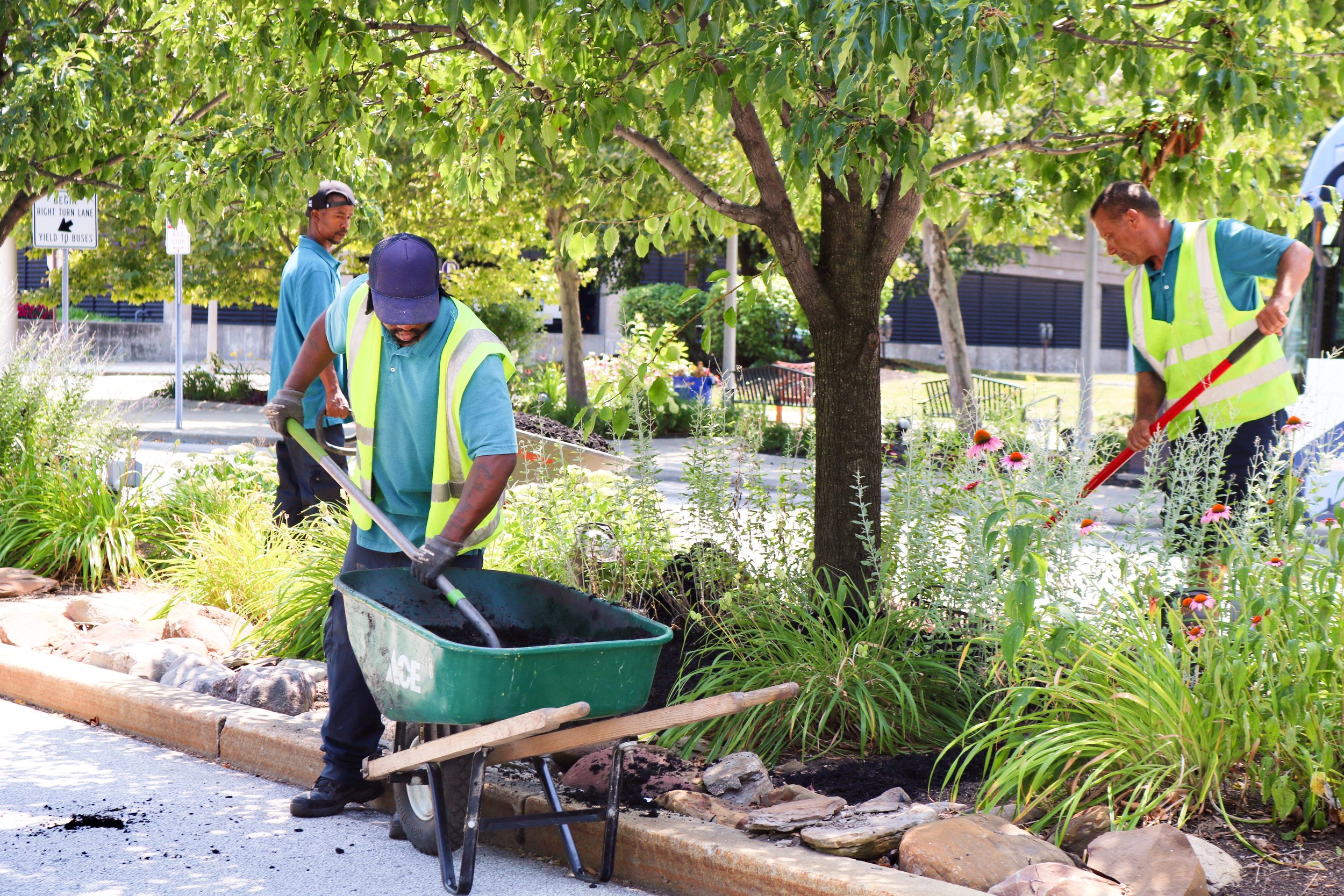DCA Leadership in Evolving Homelessness Services
Downtown organizations have the unique ability to create stronger resources and advocacy for the unsheltered population. The Downtown Cleveland Alliance (DCA) is considered a thought and operational leader in the provision and collaboration of services. As an Urban Place Management Organization (UPMO) that shares its resources with its city rather than simply offering referrals, DCA and other organizations have taken a collaborative approach in responding to escalated behavior that has shown successful results when carried out consistently. This strategy also offers a more effective and supportive approach to helping the unhoused.
This recommended collaborative approach is in stark contrast to the strategy employed by the city for the past 40 years. In the past, the U.S. model placed the responsibility to respond, assess, de-escalate, and implement a final resolution on local law enforcement. With most organizations already overburdened, agencies attempted to add training and tools to fill the service gap. The complex issues surrounding mental health and individuals in crisis require much more comprehensive and intense services. Law Enforcement and communities soon learned that much more was needed and that traditional responders may lack the training, experience, and tools to address this escalated behavior. In many cities and areas, it is not within law enforcement's capabilities to take on these additional roles of social work and crisis mitigation in addition to their regular duties.
A Unified Response
Along with the International Downtown Association (IDA), Downtown Cleveland Alliance recommends a response team that focuses specifically on escalated behavior to improve outcomes for both the person and the community. This team includes uniformed, unarmed safety ambassadors, outreach specialists who are educated and trained in social services response, medical care providers, and mental health and psychiatric providers. Individually focused, consistent, and compassionate responses to escalated behavior help create trusting, meaningful relationships between the unsheltered population and those who can provide needed resources. These recommendations come from an ensemble of worldwide experts on the subject, led by DCA’s own Edward Eckart Jr. The Top Issues Council for IDA is a group of downtown professionals working to address the topics of the day that most downtowns and urban centers must manage. DCA is a proud leader of research and initiatives that pave the road for more united downtowns across the country.
Due to the pandemic, there has been an uptick in the unhoused population and those struggling with mental illness and addiction. A reduction in services for the unhoused during the pandemic created a negative impact worldwide, with the U.S. seeing increased unemployment, a lack of housing and shelters, increased visibility, and fewer daytime activities for unsheltered people.
Chronic Homelessness
Homelessness affects many aspects of the community including public health, individual well-being, cleanliness of public and private spaces, real and perceived safety within districts, and property values. At DCA, we are taking concrete steps to advocate for and assist the unsheltered population, specifically individuals experiencing chronic homelessness, defined as anyone who has been homeless for 12 months or longer while struggling with a disability.
People experiencing chronic homelessness face the highest barriers to receiving care and services and are more often the main source of escalated behavior among all people experiencing homelessness. When compared to any other demographic group, those who experience chronic homelessness are the most vulnerable to violence and are more likely to have a health issue that leads to an untimely death. By enhancing unsheltered services, we can increase individual and public health and safety.
UPMOs rarely find themselves in the position of directly providing housing designed to end homelessness, but they serve as effective connectors and partners between the people and the vital services they need. According to the federal Substance Abuse and Mental Health Services Administration, approximately 30% of chronically homeless individuals have at least one mental health condition, with 50% suffering from co-occurring substance abuse issues These statistics point to a critical need to connect individuals with the appropriate resources.
Downtown Cleveland Takes Action
In 2022, The Downtown Cleveland Alliance partnered with Medworks and Old Stone Church to provide a free pop-up medical clinic for our unsheltered and underserved downtown population. The free monthly clinic provides health checks and mental health counseling and connects participants with essential resources and services. The program is set to expand in 2023. Additionally, DCA is the only non-public safety entity in the country authorized to transport unsheltered individuals to a diversion center providing treatment for drug addiction and underlying mental health illnesses. DCA’s outreach teams also advocate for individuals to obtain government-issued identification, birth certificates, public transit vouchers, and transportation to medical appointments. DCA also runs the SEEDS Program, which includes mentoring and employment-expectation guidance and provides opportunities for chronically unhoused individuals to learn landscape maintenance, installations, and design. The goal of this year-round program is to help participants make the transition into full-time ambassador positions or other full-time employment by the end of their SEEDS tenure.
A Different Approach to Advocacy
Successful efforts must combine addressing barriers to care, advocating for civic and nonprofit resources, and holding civic and nonprofit partners accountable in their efforts to address street behavior and vulnerability. We must preemptively seek out solutions and opportunities to support the vulnerable and unsheltered population rather than simply reacting to these issues. Supporting programs and legislation that address short- and long-term solutions and programs is essential in supporting vulnerable populations and helping to reduce homelessness. By implementing these kinds of intentional and proactive strategies, UPMOs like DCA can effectively reduce the burden on law enforcement, support the health, safety, and well-being of people experiencing chronic homelessness, and strengthen cities as a whole.




